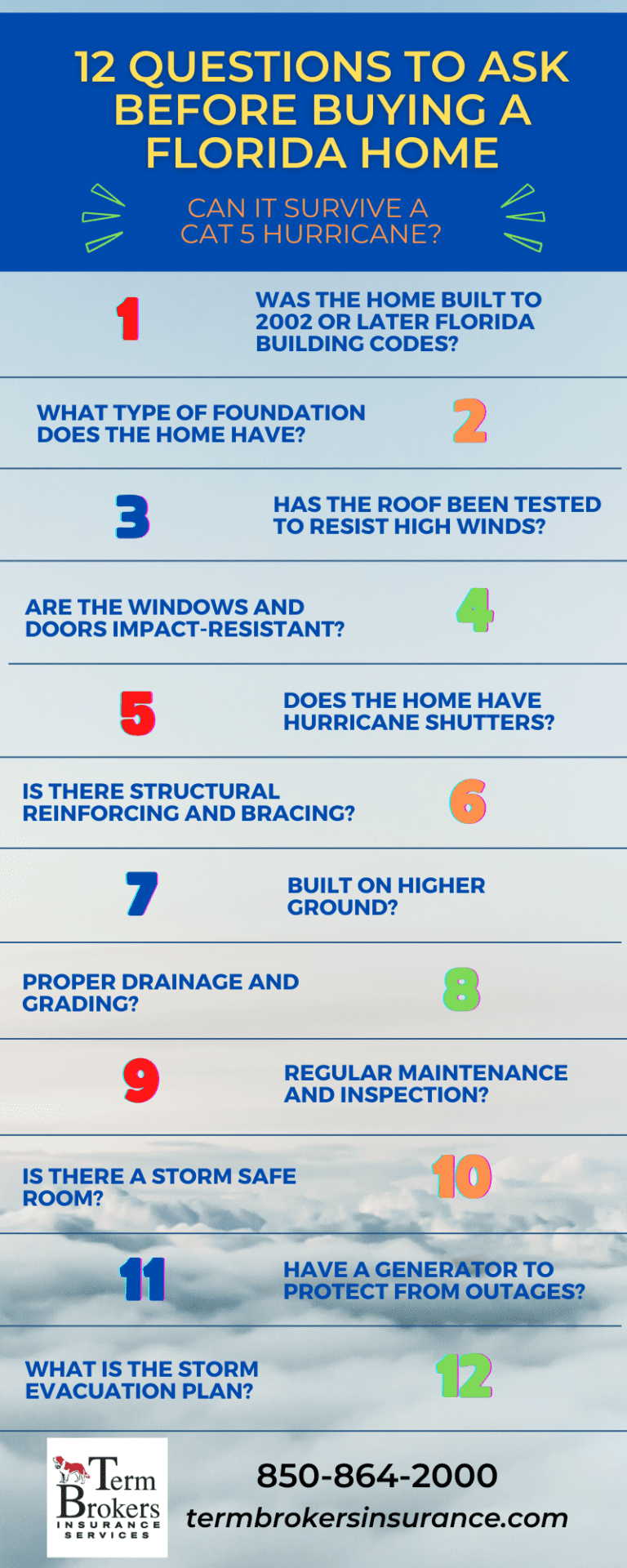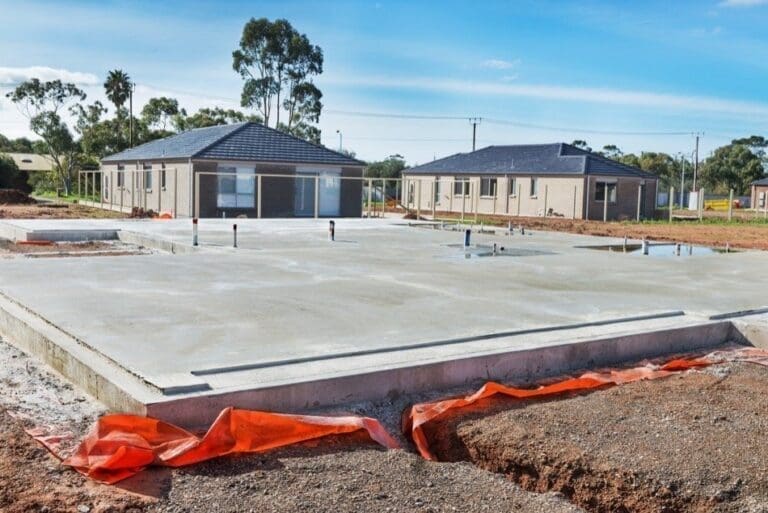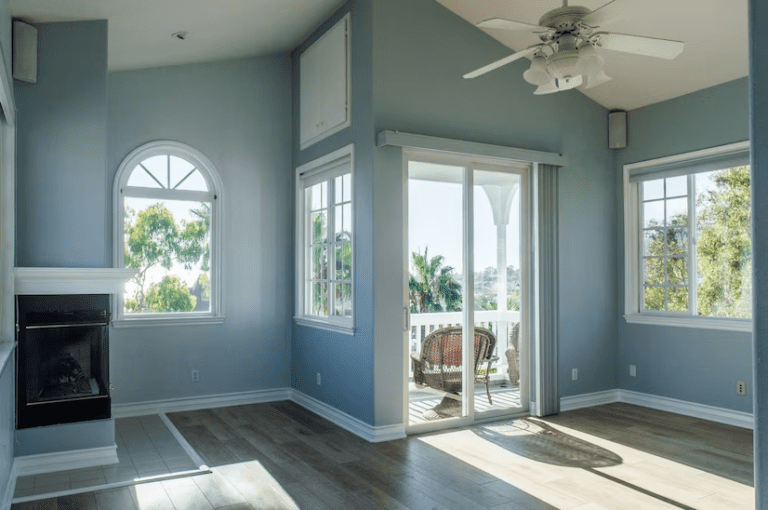A home is a significant decision, especially when buying a property in a unique location like Florida. The Sunshine State offers beautiful landscapes, a vibrant lifestyle, and year-round sunshine, but it also presents particular challenges and considerations that potential homebuyers should be aware of. Before committing to a home purchase in Florida, asking the right questions and gathering essential information is crucial to ensure you make an informed decision.
This guide provides ten essential questions before buying a Florida home. These questions cover important aspects such as building code compliance, foundation type, roof wind resistance, hurricane shutters and impact-resistant windows and doors, structural reinforcing and bracing, drainage and grading, regular maintenance and inspections, storm-safe rooms, and generator availability. By addressing these factors, homebuyers can assess the property’s suitability, safety, and potential challenges, ultimately safeguarding their investment and ensuring the well-being of their future occupants.
When purchasing a home in Florida, it is essential to consider whether the property was built in compliance with the 2002 or later Florida Building Codes. These codes are comprehensive regulations designed to ensure the safety, durability, and resilience of residential structures in the state. Let’s explore why verifying adherence to these building codes is crucial and how it can impact your investment.
Ensuring that a home meets the 2002 or later Florida Building Codes is essential for several reasons. Firstly, it guarantees enhanced safety measures, considering Florida’s susceptibility to hurricanes and strong winds. Compliance with these codes ensures the property is built to withstand severe weather conditions, providing a secure living environment for you and your family.
When considering purchasing a home in Florida, paying attention to the type of foundation the property has is essential. The foundation is the structural base that supports the entire house, and its stability and durability are crucial for the long-term integrity of the property.

Florida is known for its unique geographical features, including expansive soils and the risk of hurricanes and heavy rains. These factors can significantly impact the performance of different types of foundations. By examining the foundation of a potential home, you can assess its ability to withstand these challenges and make an informed decision about the property’s suitability for your needs.

Understanding the type of foundation a home has is crucial when buying a property in Florida. The foundation provides stability, durability, and protection against the state’s unique environmental challenges.
When buying a home in Florida, one crucial aspect is whether the roof has been tested to resist high wind speeds. Given Florida’s vulnerability to hurricanes and strong winds, ensuring that the top of the property can withstand such extreme weather conditions is essential.
Roof testing involves subjecting the roof to rigorous wind resistance tests to determine its ability to withstand high wind speeds. This testing typically involves simulated wind loads to evaluate the roof’s structural integrity, the effectiveness of its connections, and its resistance to uplift forces.
Verifying that the roof has been tested and proven to resist high winds is vital for several reasons. Firstly, it ensures the safety and protection of the home and its occupants during severe weather events. A roof designed and tested to withstand high wind speeds is less likely to sustain damage or be susceptible to uplift, reducing the risk of structural failure and potential water intrusion.
Living in Florida means being prepared for the potential impact of hurricanes and severe weather conditions. One crucial aspect to consider when buying a home in the Sunshine State is whether it has hurricane shutters. These protective coverings are vital in safeguarding your property against high winds, flying debris, and water infiltration during a storm.
When buying a home in Florida, it is crucial to inquire about the presence of hurricane shutters. These protective coverings offer enhanced storm protection, insurance benefits, convenience during storm preparations, and potential resale value.
When considering buying a home in Florida, it is crucial to inquire about the impact resistance of the windows and doors. Florida’s coastal areas are prone to hurricanes and severe storms, which can generate high winds and flying debris. Therefore, having impact-resistant windows and doors is essential for the property’s and its occupants’ safety and protection.
Impact-resistant windows and doors are designed to withstand the impact of flying objects during extreme weather events. They are constructed with laminated glass and reinforced frames, making them highly resistant to shattering. These specialized features protect against debris, provide added security against break-ins, and reduce noise transmission.
Investing in a home with impact-resistant windows and doors offers several advantages. Firstly, they enhance the overall safety and security of the property, minimizing the risk of injury and property damage during storms. Secondly, they provide energy efficiency by reducing air leakage and heat transfer, contributing to lower utility bills. These features can also qualify homeowners for insurance discounts due to the reduced risk of damage.

Another important question before buying a home in Florida is whether the property has sufficient structural reinforcing and bracing. Florida’s geographical location makes it susceptible to hurricanes and strong winds, making vital structural elements crucial for the safety and longevity of a home.
Structural reinforcing and bracing refer to the additional supports and reinforcements integrated into the building’s framework to enhance its ability to withstand external forces. This includes reinforced walls, hurricane straps or clips, roof-to-wall connectors, and impact-resistant windows and doors.
Verifying the presence of structural reinforcing and bracing is vital as it directly affects the home’s resilience during severe weather events. These measures help prevent structural failure, reduce the risk of damage, and provide better protection for the occupants.
When evaluating a potential home purchase in Florida, assessing the property’s drainage and grading is essential. Proper drainage and grading play a vital role in preventing water accumulation, protecting the foundation, and ensuring the overall stability of the home.
With its heavy rainfall and occasional flooding, Florida’s climate makes it crucial to have adequate drainage systems. Improper drainage can lead to water pooling around the foundation, which may cause damage, erosion, or even structural issues over time. It can also create an environment conducive to mold growth, compromising indoor air quality and the overall health of occupants.
Grading refers to the slope of the land surrounding the property. The ground should be properly graded to direct water away from the foundation, preventing water infiltration. Proper grading ensures that water flows away from the home, reducing the risk of water damage and potential flooding.
When buying a home in Florida, it’s essential to consider the property’s regular maintenance and inspection requirements. Proper maintenance and routine inspections ensure the home’s longevity, functionality, and safety.
Regular maintenance involves:
By staying on top of maintenance tasks, you can prevent minor issues from escalating into more significant problems that could be costly.
Additionally, regular inspections are vital to identify potential issues before they become major concerns. Inspecting the home’s structural elements, electrical systems, plumbing, roofing, and other critical components is essential. In Florida, inspections should also include checks for signs of moisture intrusion, mold growth, and termite infestations, given the state’s unique climate and potential risks.
Living in Florida means being prepared for severe weather events, particularly hurricanes. Therefore, one essential question when buying a home in the Sunshine State is whether it has a storm-safe room. Also known as a hurricane shelter or a designated safe space, a storm safe room is a reinforced area designed to protect against extreme weather conditions.
A storm-safe room offers a secure and fortified space within the home where occupants can seek shelter during hurricanes or tornadoes. These rooms are constructed with solid materials and are built to withstand high winds and flying debris. They often feature reinforced walls, impact-resistant windows, and a concrete roof, providing a reliable and safe haven during severe storms.
A storm-safe room in your home offers peace of mind and an added layer of protection for you and your family. It ensures you have a designated area to seek refuge in dangerous weather, reducing the risk of injury and providing security during storms.
When purchasing a home in Florida, you must inquire whether the property has a generator. Given the state’s susceptibility to severe weather events, including hurricanes and tropical storms, power outages can occur, leaving homes without electricity for extended periods. Having a generator can be a valuable asset in such situations.
A generator is a backup power source, providing electricity to essential appliances and systems during power outages. It ensures that critical functions, such as lighting, refrigeration, heating or cooling, and communication devices, can continue operating, enhancing occupants’ comfort and safety.
In Florida’s hot and humid climate, a generator becomes even more crucial as it helps preserve perishable food, prevents mold growth due to a lack of air conditioning, and enables the use of necessary medical equipment or medications.
When it comes to buying a home in Florida, it’s important to approach the process with confidence. By asking the ten essential questions outlined in this guide, you can gather crucial information about the property’s suitability, safety, and potential challenges. Ensuring compliance with Florida Building Codes, verifying the type of foundation, assessing the roof’s wind resistance, and checking for hurricane shutters and impact-resistant windows and doors are all vital steps for protecting your investment and the safety of occupants.
In addition, it’s important to inquire about structural reinforcing and bracing, proper drainage and grading, and the need for regular maintenance and inspections to ensure the longevity and functionality of your new home. A storm-safe room and generator can also provide added peace of mind and comfort during severe weather events and power outages.
By addressing these key considerations before purchasing a home in Florida, you’ll be well-prepared to make informed decisions and minimize potential risks. And remember, consulting with professionals such as home inspectors, contractors, and insurance agents can provide further guidance specific to your situation. With confidence and thorough due diligence, you can embark on your homeownership journey in the Sunshine State.
To learn more about saving on your home insurance check out SIX TIPS TO SAVE ON YOUR HOME INSURANCE.

Term Brokers Insurance Services is an expert in finding the right insurance for our clients. We take the time to get to know you and your family to find the best coverage for your needs.
Where you lived: